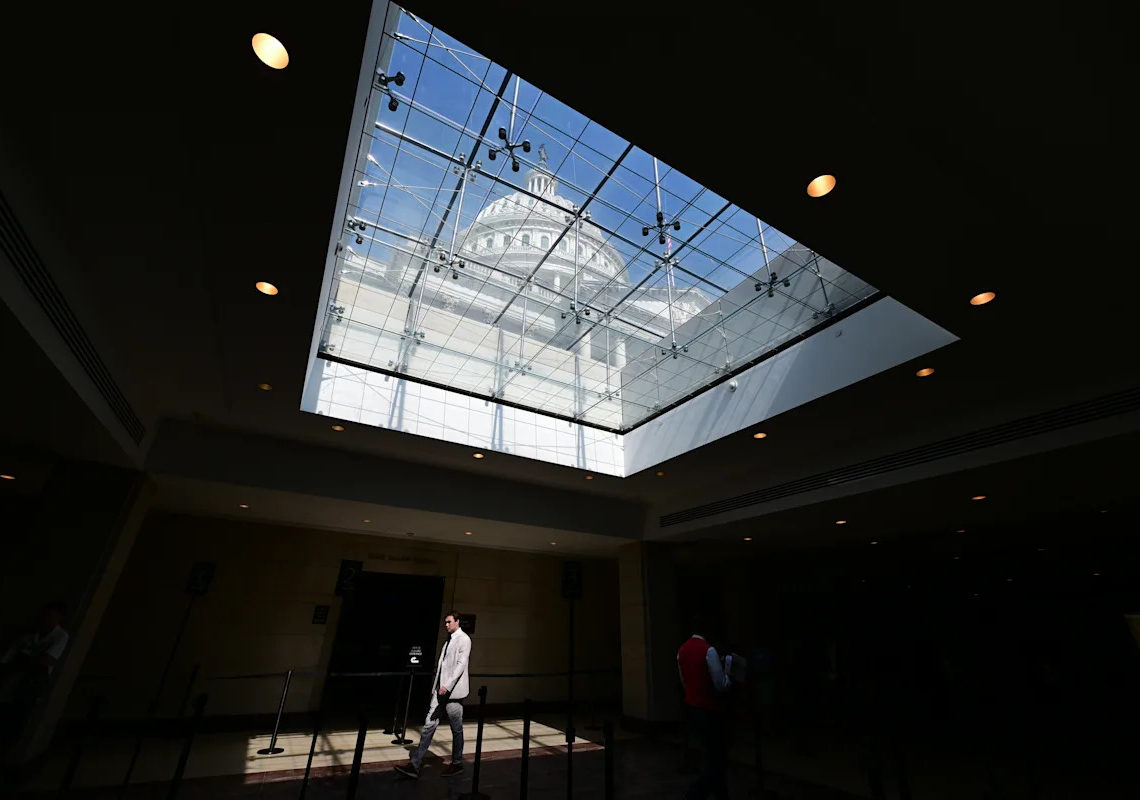The Senate Republican tax bill speeding to passage includes the biggest reduction of funding for the federal safety net since at least the 1990s, targeting more than $1 trillion in social spending.
Although the legislation is still estimated to cost more than $3 trillion over the next decade, the Senate GOP tax bill partially pays for its large price tag by slashing spending on Medicaid and food stamps, which congressional Republicans maintain are rife with fraud.
The tax bill centers on making permanent large tax cuts for individual taxpayers, extending the cuts that Republicans first enacted under President Donald Trump’s first term. The bill includes an increase to the standard deduction claimed by most taxpayers, rate reductions for most U.S. households, and a partial version of Trump’s plan to end taxes on tipped wages, among many other provisions.
But it offsets these expensive tax cuts in part through what several experts said may prove to be the most dramatic reductions in safety net spending in modern U.S. history. While last-minute changes to the bill text makes precise estimates impossible, the legislation appears on track to cut Medicaid by about 18 percent and the Supplemental Nutrition Assistance Program (SNAP) by roughly 20 percent, according to estimates based on projections from the nonpartisan Congressional Budget Office.
Previously, the biggest recent cut to food stamps was a roughly 14 percent cut approved by Congress during President Bill Clinton’s administration in the 1990s, according to Bobby Kogan, a senior policy analyst at the Center for American Progress, a center-left think tank. (Food stamp benefits also sharply increased, and then fell, after the expiration of covid benefits.) The biggest prior cut to Medicaid was during President Ronald Reagan’s term in the 1980s, when Congress and the White House approved a roughly 5 percent reduction to the federal health insurance program that primarily benefits low-income households during his first two years in office, Kogan said.
The Congressional Budget Office has estimated that the Senate tax bill will lead to roughly 12 million fewer people receiving Medicaid and more than 2 million fewer people receiving food stamps.
“This is not only the biggest ever – it’s by a mile the biggest ever,” Kogan said. “You can very safely say this is the biggest cut to programs for low-income Americans ever.”
The legislation achieves these steep reductions by imposing a slew of new requirements and restrictions on low-income Americans who rely on government assistance, although it includes some revisions sought by nonpartisan experts as well.
On Medicaid, the bill institutes new federal work reporting requirements for the first time in the program’s history – forcing millions of people to regularly prove they are working at least 80 hours a month to keep their health insurance. The bill provides exemptions for certain groups of people, including those who are pregnant, some caretakers and those with disabilities. But it also imposes burdensome paperwork requirements that experts say states are ill-equipped to take on, and they warn that both those who are meeting the requirements and who qualify for exemptions could lose coverage because they will struggle to submit proper documentation.
The bill also mandates that people just above the federal poverty line begin paying out of pocket for Medicaid services, such as some doctor’s visits or lab tests. States would be allowed to charge these enrollees up to 5 percent of their income in cost-sharing – a fee that could amount to hundreds of dollars annually. While Democratic-led states might opt for modest co-pays, Republican-led states could impose substantially higher fees, potentially pricing out many low-income residents, experts said. Although it’s unclear if this measure will survive final passage, the legislation has also sought to crack down on loopholes that raise what the federal government is reimbursing hospitals for Medicaid services, said Marc Goldwein, senior vice president at the Committee for a Responsible Federal Budget, a nonpartisan group.
The changes to Medicaid could also force already struggling rural hospitals to close or significantly pare back their services, hospital groups have said. Between a rise in uncompensated care and smaller federal reimbursements through states because of changes to what is called the provider tax, hospitals are expected to take a significant hit.
“No question – this is definitely the biggest cut. It’s the biggest rollback in federal support for health care ever,” said Larry Levitt, executive vice president for health policy at KFF.
On food stamps, the bill rolls back decades of long-standing policy by tightening work requirements. Parents of children have generally been exempt from work rules, but under the new proposal, single mothers of teenagers as young as 14 would be required to work or lose benefits. The bill also raises the upper age for able-bodied adults without dependents who are subject to work requirements from 49 to 64, sweeping in millions of older Americans previously shielded from the rules. Additionally, it would make it harder for states to waive work requirements during times of high unemployment, effectively limiting assistance unless a generationally severe recession hits.
The legislation also changes how poverty and household budgets are calculated for the purposes of food stamp eligibility, potentially reducing benefits for millions. Under President Joe Biden, internet access was recognized as a basic necessity for modern life and factored into cost-of-living calculations that help determine eligibility and benefit levels. The new bill reverses that.
Conservatives and Republicans have defended these changes as necessary to arrest the rising cost of safety net programs. Robert Rector, research fellow at the Heritage Foundation, a conservative think tank, said U.S. food stamps are rife with fraud, saying the federal government’s spending on welfare programs has risen from about $1 trillion per year before the covid pandemic to $1.69 trillion now. Rector said stricter limits in particular made sense for the food stamps program.
“Welfare spending is out of control. Fraud is out of control,” Rector said. “There’s extensive massive fraud. There’s massive fraud in food stamps in particular.”
Sen. Markwayne Mullin (R-Oklahoma) on Sunday argued on “Meet the Press” that the legislation was only “getting out the ones that should never be” on Medicaid and was focused on “able-bodied” individuals.
“We don’t pay people in this country to be lazy. We want to give them an opportunity, and when they’re going through a hard time, we want to give them a helping hand,” Mullin said. “That’s what Medicaid was designed for, and it’s unfortunately, it’s been abused.”
But Republicans may face political blowback if the changes to the safety net programs result in significant reductions in benefits. The cuts also fly in the face of prior promises made by party leaders: Vice President JD Vance has long been critical of cuts to Medicaid, and Trump has repeatedly promised not to reduce benefits in the program. Even as the bill moves toward passage, some congressional Republicans from rural states have also expressed concern about the political impacts of cuts to Medicaid.
“Let’s watch and be careful that we don’t cut into bone, don’t hurt our rural hospitals,” Sen. Jim Justice (R-West Virginia) said late last week. “If we do that, it’s going to be a bad day.”
Others had hoped large spending cuts would at least be used to reduce the nation’s $36 trillion federal debt. Goldwein, of the Committee for a Responsible Federal Budget, said it is a shame that Republicans are using funding from spending cuts only to partially mitigate the more than $3 trillion cost of their tax bill.
“What bothers me is there are really hard savings to find in here. But all the money is being used not for deficit reduction, not to fully pay for tax cuts, but to reduce the amount of money we’re borrowing,” Goldwein said. “We’re going in the wrong direction.”
– – –
Yasmeen Abutaleb and Jacob Bogage contributed to this report.
Related Content
Lights! Camera! But not enough action in a fading, worried Hollywood.
Facing entry-level job crunch, new grads question the value of a degree
Dynamite outside a synagogue: Civil rights stories imperiled by federal cuts
The post Senate GOP tax bill includes largest cut to U.S. safety net in decades appeared first on Washington Post.



